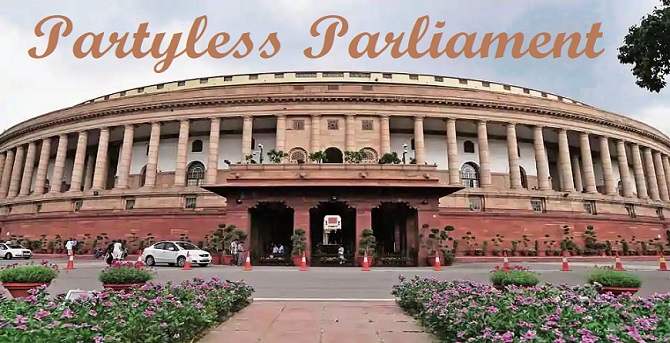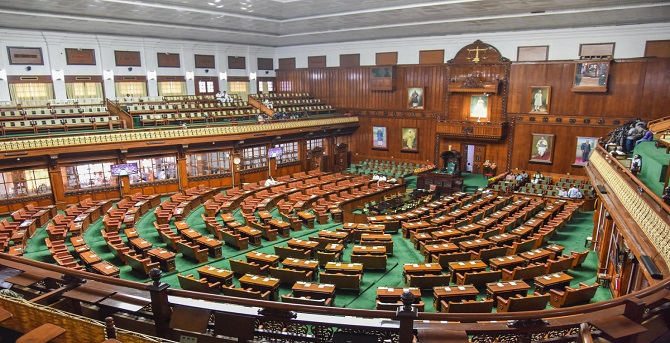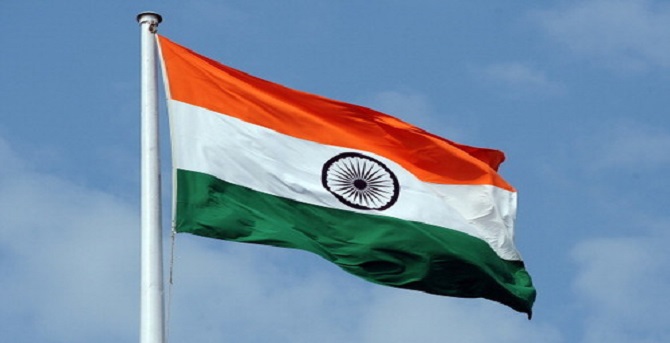New
Governance System - Partyless Parliament
The People's Voice Society APPRECIATES MANISH TEWARI'S SUGGESTIONS ON PARTY WHIP.
I got inspired to write this communication after reading your piece in Indian Express, dated 7th August 2021.
https://indianexpress.com/article/opinion/columns/does-india-even-need-a-parliament-7442286/
In the article, You have suggested withdrawing the Party whip by amending the 10th schedule in certain specified cases.
Our society considers the suggestion very appreciably which was given by you 11 years ago, but alas! Still, there is no sign of implementation. If this small suggestion gets implemented, there can be a sea change in the contribution of each MP/MLA towards the working of parliament /Assemblies. Every member can express his/her opinion fearlessly.
Mr. Tiwari, our society known as The People's Voice has been in existence for more than a decade, out of which for the last five years we have been persistently trying to make our country a cohesive society rather than fiercely divided.
While the above project is an ongoing process, we have embarked on a new project, which we want to present to you for your feedback before calling for a nationwide debate on the "New System of Governance" The following are the salient points that THE PEOPLE'S VOICE wants to place before citizens for in-depth debate on the new Governance system.
1) Introduce a new public service commission to facilitate aspiring politicians future-ready. It could be named "The Indian Governance Service "or IGS. Nurturing accomplished leaders by imparting proper education and training should be the ultimate goal of the institution. It can run on the lines of existing services such as IAS, IPS, IFS.
2) Establish State-wise Universities to educate the aspirant politicians to start their career in politics. Such Universities could name as "University of Governance"
3) Universities should have a curriculum to cover all the ministries /constitutional posts.
4) Those aspirants who qualify from the University of Governance should become eligible to fight the election as independent candidates.
5) There should be no political party. All elections should be State-funded and conducted under the aegis of the Election Commission once every five years.
6) Starting from Panchayats, Municipalities, Vidhan Sabha, Lok Sabha, Rajya Sabha, all will have independent members with a Full Term of 5 years.
7) All elected bodies such as state assemblies Lok Sabha & Rajya Sabha should have a fixed timetable to work, same as school, courts, etc.
8) All Ministers in States and centre up to Prime Ministers should get elected by members of Vidhan Sabha, Lok Sabha, and Rajya Sabha, on the floor of the Lok Sabha/Rajya Sabha.
9) All Ministers should function under the aegis of related bodies. All statutory bodies like various forces, police, taxation, and various others will independently work under the supervision of Parliament. In case a no-confidence motion against PM and his cabinet are passed, PM and others can be elected from the same Parliament ensuring that the duration of 5 years of Parliament does not get disturbed.
The members of THE PEOPLE'S VOICE have a firm belief that the above system will offer a much better environment of Governance under which the economic progress can be much faster than the present system. The above- mentioned points are made broadly to trigger nationwide debate for which the members of THE PEOPLE'S VOICE society are ready to debate anywhere in India. We would like to invite your comments/counter comments for which we can hold virtual/physical meetings as the time permits in the coming days.
Nepal President dissolves Parliament; announces mid-term polls in November 22/05/2021
Suggestions to exercise new ways of Governance in view of current political crisis in Nepal 22/05/2021.
We are a Non- Governmental Organization from India. We have been actively working for last six years on the issue of eradication of caste discrimination.
Basic purpose of NGO is to serve social and political objectives such as humanitarian causes. We have been studying and preparing a white paper to suggest to the People of India a new system of governance. Being an NGO it’s our moral obligation to share our views which can help you in facilitating a stable and good government in Nepal.
We all know that Nepal is going through political crisis. Traditionally the post of PM has been very volatile in Nepal with 49 Prime Ministers donning the chair in last 58 years. Even after getting the majority in 2018, current ruling establishment is in total disarray. Same has been evident since December,2020. Supreme Court had to intervene in political set up which is not a very healthy sign in democracy.
Nepal has Parliamentary system of governanace in which the party or a coalition of parties, with majority, forms the government. Coalition governments have their own set of challenges. Due to differences in opinions and ideologies, decision making is usually slow and weak. This leads to hindrances and hassles in execution leading to failure of management and governance on many fronts including economy, defence and internal stability.
The current chaos in Nepal is perfect example of how coalition works. It affects the country as a whole. . In such arrangements, a party with less support could impose its views and policies on the majority. Shared decision making can make the progress slow and often resulting in policy paralysis.
It is perceived that Political Parties are essence of democracy, at the same time they are responsible for the deterioration of democracy. To propagate the idea of partyless democracy,in order to free democracy from the clutches of political parties, is the only way out. In partyless democracy elections are not contested on party lines but on individual basis.Since Nepal and India have very similar Parliamentary multi party system and Governance,we feel what is good for India should be good for Nepal .We are therefore taking liberty of making few suggestions for introducing new form of governance through the letter:
1) Individuals from various public services should be elected for contesting the election. Their education and training make them competent enough to run the public administration in a way that every citizen can feel secured and live a peaceful and happy life. Educational eligibility should be the criteria of selecting candidates.
2) Universities should be there for teaching/training about governance , just like there are universities for different professions. Preferably, a common entrance test should be conducted on the lines of other competitive exams for securing admissions. Imparting education would help students in doing research and development for different aspects of governance . For example : what expertise is required for a particular ministry? Serving the nation should be the motto of enrollment instead of money making .
3) A fixed age limit should be defined for both entry and exit . By fixing a particular age new generation will get a chance to enter politics on their merit. This way culture of nepotism will end in politics.
4) Retired members of parliament can join the university of governance as mentors. They can also act as a think tank and provide time to time guidance to young leaders.
5) Individuals will contest from the constituencies where they have been born and brought up. One can contest only from his/her native constituency and only for one seat.
6) The Country will not have any political party. All political parties should be dissolved and the net assets should be invested with the Government.
7) Election Commission should oversee the elections. It should bring parity for all the candidates and should bear all the expenses. No individual should bear the cost of election.
I hope you will find these ideas constructive. Thanks for the time given to go through this letter.
Benjamin Netanyahu gets first crack at forming new Israel government 07/04/2021
Suggestions to exercise new ways of Governance in view of current political crisis in Israel 07/04/2021
We are a Non- Governmental Organization from India. We have been actively working for last six years on the issue of eradication of caste discrimination.
Basic purpose of NGO is to serve social and political objectives such as humanitarian causes. We have been studying and preparing a white paper to suggest to the People of India a new system of governance .Being an NGO it’s our moral obligation to share our views which can help you in facilitating a stable and good government in Israel.
We all know that Israel is going through political crisis. Four Knesset elections were held In the span of two years: April 2019, September2019, March2020 and March 2021(Courtesy-media sources). Difficulty in formation of stable coalition emerged as a cause for these consecutive elections. Not even a single party got the majority and as a result every time the Knesset got dissolved.
Israel has Parliamentary system of governanace in which the party or a coalition of parties,with majority,forms the government. Coalition governments have their own set of challenges. Due to differences in opinios and ideologies, decision making is usually slow and weak. This leads to hindrances and hassles in execution leading to failure of management and governance on many fronts including economy, defence and internal stability.
The frequent dissolutions of Israeli parliament in two years is perfect example of how coalition works. It affects the country as a whole. . In such arrangements, a party with less support could impose its views and policies on the majority. Shared decision making can make the progress slow and often resulting in policy paralysis.
It is perceived that Political Parties are essence of democracy, at the same time they are responsible for the deterioration of democracy. To propagate the idea of partyless democracy,in order to free democracy from the clutches of political parties, is the only way out. In partyless democracy elections are not contested on party lines but on individual basis . Since Nepal and India have very similar Parliamentary multi party system and Governance,we feel what is good for India should be good for Nepal. We are therefore taking liberty of making few suggestions for introducing new form of governance through the letter.
1) Individuals from various public services should be elected for contesting the election. Their education and training make them competent enough to run the public administration in a way that every citizen can feel secured and live a peaceful and happy life. Educational eligibility should be the criteria of selecting candidates.
2) Universities should be there for teaching/training about governance , just like there are universities for different professions. Preferably, a common entrance test should be conducted on the lines of other competitive exams for securing admissions. Imparting education would help students in doing research and development for different aspects of governance . For example : what expertise is required for a particular ministry? Serving the nation should be the motto of enrollment instead of money making .
3) A fixed age limit should be defined for both entry and exit . By fixing a particular age new generation will get a chance to enter politics on their merit. This way culture of nepotism will end in politics.
4) Retired members of parliament can join the university of governance as mentors. They can also act as a think tank and provide time to time guidance to young leaders.
5) Individuals will contest from the constituencies where they have been born and brought up. One can contest only from his/her native constituency and only for one seat.
6) The Country will not have any political party. All political parties should be dissolved and the net assets should be invested with the Government.
7) Election Commission should oversee the elections. It should bring parity for all the candidates and should bear all the expenses. No individual should bear the cost of election.
I hope you will find these ideas constructive. Thanks for the time given to go through this letter.




